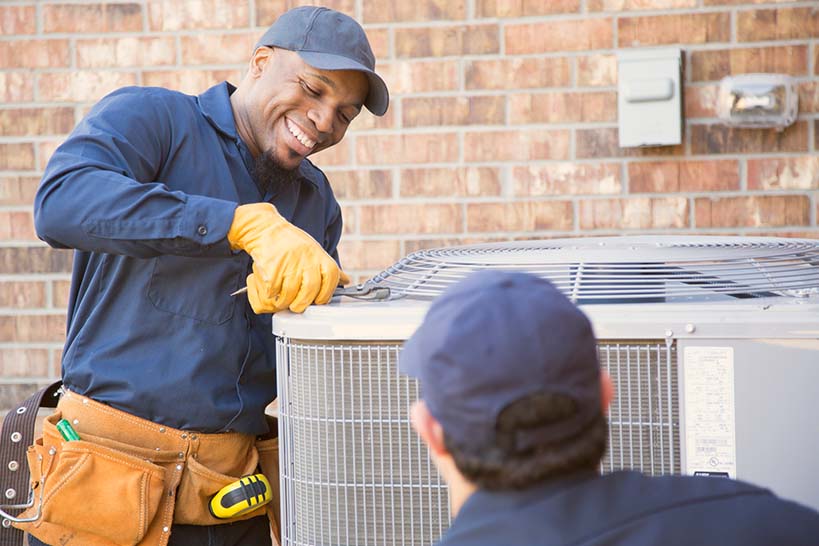HVAC Technician
If you like to work with your hands and are a problem-solver, a career in HVAC might be perfect for you.
HVAC Technician
If you like to work with your hands and are a problem-solver, a career in HVAC might be perfect for you.
High Quality VR-Based HVAC Training
Train smarter and harder. Quickly gain the experience you need to become job-ready as an HVAC Technician with state-of-the-art virtual reality skills training.

12 Weeks
Program Length

Certification

Certification

Certification

Career Insight
What does an HVAC Technician do?
Performing general maintenance on HVAC/R systems
Install HVAC units and other systems according to architectural designs
Diagnose electrical and mechanical faults in HVAC systems
Perform emergency repairs promptly and efficiently
63, 846
HVAC APPRENTICES EACH YEAR IN THE US
Note: Salaries can vary widely depending on education, experience, employer, and even geographic area. Job and salary information is from ziprecruiter.com and the U.S. Department of Labor Statistics. Data is updated annually to reflect industry changes.
JOB OUTLOOK
Potential Career Paths
A qualified heating, ventilation, and air conditioning (HVAC) technician is the conduit between climate control and comfort. HVAC technicians play an essential role in ensuring comfortable indoor environments by installing, maintaining, and repairing a diverse range of systems that control temperatures as well as air quality.
This course will prepare you to find a job as an HVAC Apprentice and start your training as a fully licensed HVAC Technician.
Individuals who complete this program and possess the subsequent certifications have the skills to find jobs as:
HVAC Helper
HVAC Installer
HVAC Apprentice
HVAC Technician
JOB OUTLOOK
Potential Career Paths
A qualified heating, ventilation, and air conditioning (HVAC) technician is the conduit between climate control and comfort. HVAC technicians play an essential role in ensuring comfortable indoor environments by installing, maintaining, and repairing a diverse range of systems that control temperatures as well as air quality.
This course will prepare you to find a job as an HVAC Apprentice and start your training as a fully licensed HVAC Technician.
Individuals who complete this program and possess the subsequent certifications have the skills to find jobs as:
HVAC Apprentice
HVAC Technician
HVAC Helper
HVAC Installer
63, 846
HVAC APPRENTICES EACH YEAR IN THE US
Note: Salaries can vary widely depending on education, experience, employer, and even geographic area. Job and salary information is from ziprecruiter.com and the U.S. Department of Labor Statistics. Data is updated annually to reflect industry changes.
Soft Skills Check
Do You Have What It Takes To Succeed?
Common Attributes of Successful HVAC Technicians

Attention to Detail
Little mistakes can have big effects. HVAC technicians must be detail-oriented to ensure their job is done correctly the first time.
Mechanical Aptitude
HVAC technicians work on many complicated systems and must have an understanding of components, systems, testers, and tools
Time Management
Due to the urgency of repairs and maintenance, HVAC technicians must be able to move from one job to the next in a timely manner.
Patience
HVAC technicians have to think fast under pressure – they must identify problems with complex systems and make repairs while keeping their cool.
Physical Aptitude
HVAC technicians often work with heavy machinery which can be physically demanding.
Immersive VR Learning
- Explore real-world scenarios with interactive 3D simulations.
- Get unlimited, hands-on practice in a safe, virtual environment.
- Gain confidence and build your skills in a way not available in a typical classroom setting.


Train and Get Certified
- Prepare and review for your NATE Certification exam while working through your HVAC training curriculum.
- Provide potential employers with evidence of skills gained.
COURSE OVERVIEW
HVAC Technician
HVAC/R is one of the most constant industries for new jobs. This program prepares students for entry-level roles in the HVAC/R field. After completing the program, you will be able to perform general maintenance on HVAC/R systems, troubleshoot common HVAC/R electrical devices, safely work with and handle refrigerants, and gain an understanding of the common tools that are used in the HVAC/R trade.
After completing this 9-12 week online training, students will be prepared to be part of the HVAC/R field and will receive an HVAC Career Prep Professional Certificate of Completion. In addition, upon successful completion of the program, the student is prepared to sit for the following certification(s):
NATE Ready-to Work, OSHA 10-Hour Construction Industry, and EPA 608.
Scheduling Details
Schedule: Coursework available 24/7
Total Course Hours: 100
Estimated Completion Time:
Flexible scheduling…You decide how quickly you want to get certified.
- Students who commit 20 hours/week can complete in 4 weeks.
- Students who commit 10 hours/week can complete in 8 weeks.
Maximum time to complete: Students have access to the online course materials for 12 months.
Instruction & Evaluation Strategies
- Self-directed study
- Skills demonstrations, simulations, and online activities to aid learning
- Quizzes and Exams
The majority of this course will be conducted through drill exercises and related learner-centered practice activities and quizzes based on the knowledge you have gained through completing each chapter. Be prepared for a thorough, and extensive hands-on experience.
Books and Materials Used:
No books necessary for this course. All materials are on-line.
Outline/Lessons
Module 1: What is HVAC
This module covers general information on the industry, systems, and components. You will also be introduced to HVAC safety and the basic tools. Common math skills such as fractions and conversions will also be covered.
Module 2: HVAC Fundamentals
In this module, you will learn common HVAC systems that heat or cool a structure. This module will also cover what happens inside an HVAC unit. You will be introduced to the maintenance needed on air conditioning systems and heating systems. Lastly, you will explore the fundamental electrical concepts in simple terms and how they relate to each other.
Module 3: Electrical for HVAC/R
In this module you will learn the symbols and diagrams for the HVAC system. You will also learn how to use a multimeter, switches, loads and circuits. Motors used in residential and commercial settings will be introduced. This module covers contactors, contactor troubleshooting, and motor starters. You will learn about the different types of thermostats and heating controls. The module concludes with the mathematical relationship between volts, amps and ohms using the Ohm’s Law.
Module 4: HVAC Refrigeration
This module introduces you to refrigeration systems including regulations, tools used and basics of pressure and refrigerants. You will also learn some of the science that supports mechanical systems. Evaporators and condensers are covered. Lastly, you will learn how to troubleshoot a major component of any HVAC system.
Module 5: HVAC – Evacuation and Charging
This module covers compressors and how to diagnose problems. You will also learn how to locate leaks, evacuation methods and charging. This module also goes into detail about charging such as tools and rules. Lastly, you will learn how to diagnose A/C systems.
Module 6: HVAC Troubleshooting
This module introduces you to heat pumps and how to troubleshoot them. You will also learn different methods for measuring airflow in a blower. This module will cover common electrical and mechanical faults of a typical split residential A/C system.
Upon successful completion students will be able to:
- Explain what a HVAC system is, and the basic safety and tools related to it.
- Identify HVAC systems and their parts and how to maintain them.
- Identify the parts and tools used for the electrical component of an HVAC system.
- Describe HVAC refrigeration systems as they pertain to temperature, pressure, and heat.
- Explain how to troubleshoot basic circuits, motors, residential A/C systems, and heat pumps.
- Explain compressors and how to diagnose compressor problems.
- Describe heat pumps and their usage.
Find Your Fit
Talk With an Expert
When choosing a school, it’s important to consider how it will fit in with your life. You’ll need the right program, the right funding, and the right resources and support to help you succeed.
In addition to offering comprehensive student support dedicated to helping you reach your goals, NTI’s online programs work within your schedule. Call today at (469) 930-2404 to connect with an advisor or fill out the form below. We’re here to help!
